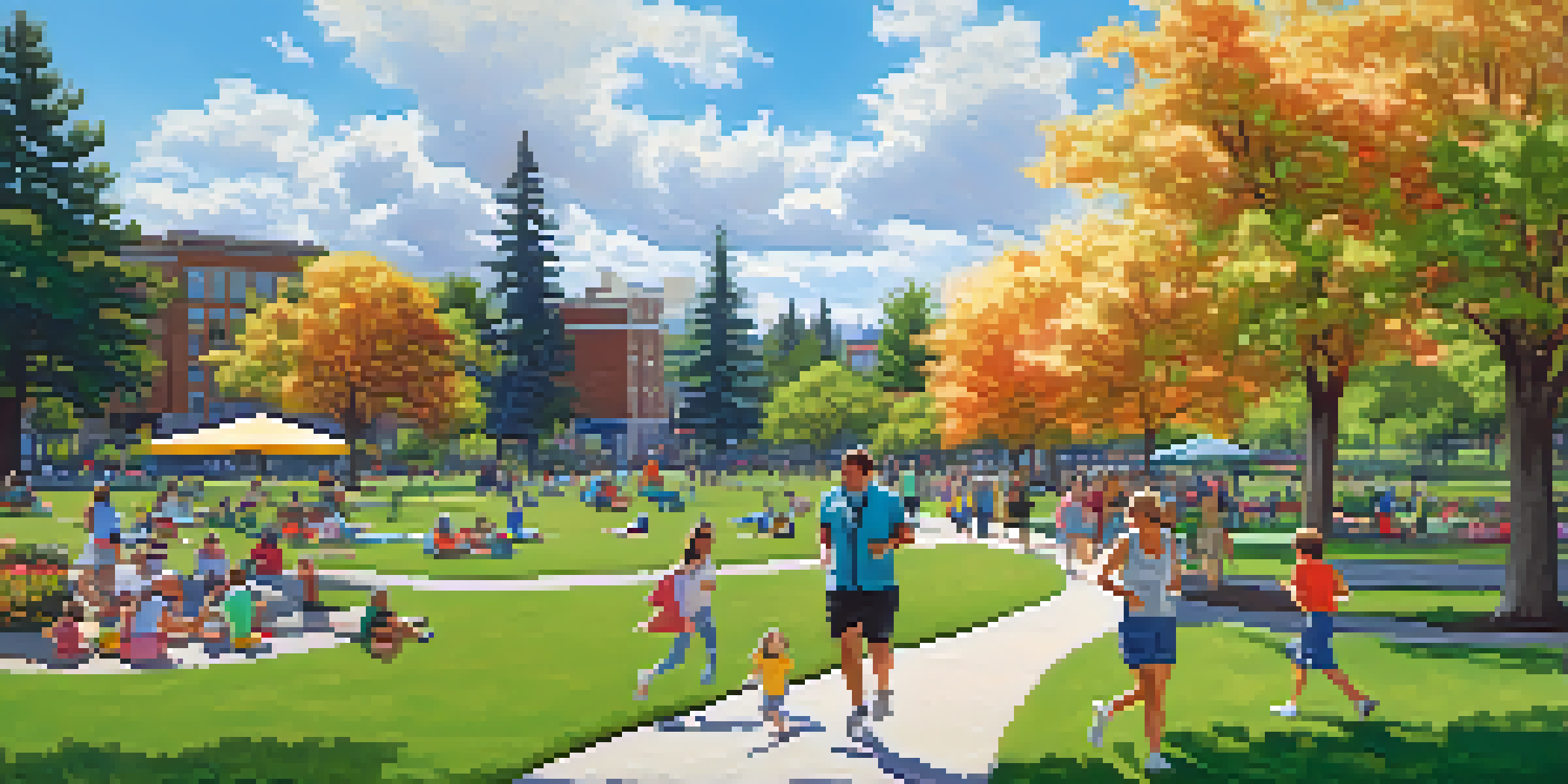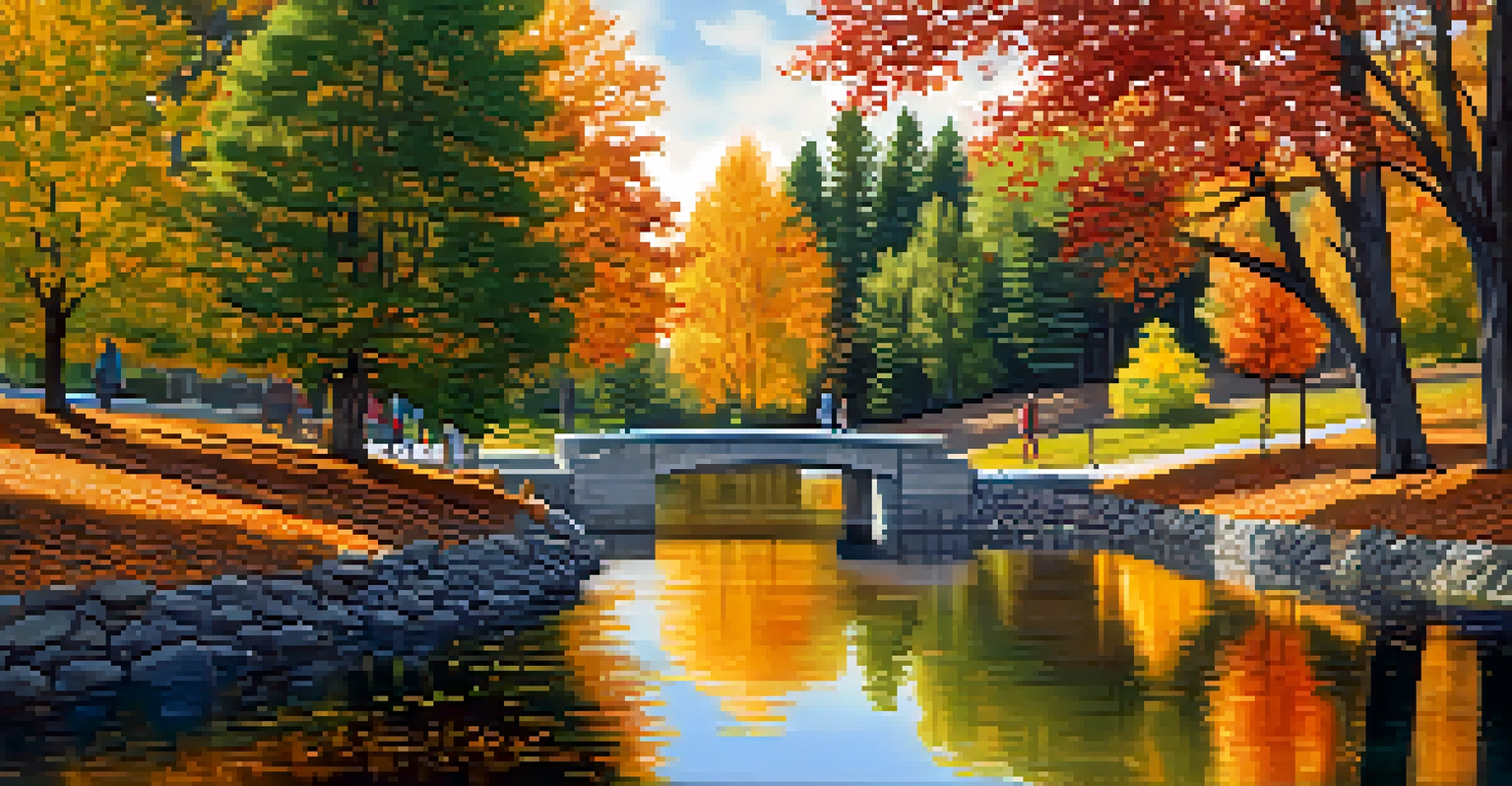Spokane's Green Spaces: Parks Promoting Environmental Health

The Importance of Green Spaces in Urban Areas
Green spaces play a crucial role in urban environments, offering benefits far beyond aesthetics. They improve air quality, reduce noise pollution, and provide essential habitats for wildlife. In cities like Spokane, parks serve as vital lungs, filtering pollutants and giving residents a breath of fresh air amidst the hustle and bustle of daily life.
Green spaces are not just a luxury; they are a necessity for our health and well-being.
Moreover, these green areas encourage physical activity and mental well-being. Whether it's a jog in the park, a leisurely stroll, or a gathering with friends, having accessible green spaces promotes a healthier lifestyle. Spokane's parks not only serve as recreational spots but also as community hubs that foster social connections.
Finally, green spaces contribute to biodiversity, which is essential for ecological balance. By preserving native plants and creating habitats, Spokane's parks support various species, ensuring that nature thrives even within urban settings. This interconnectedness highlights the need for sustainable management of these essential areas.
A Closer Look at Spokane's Iconic Parks
Spokane is home to several iconic parks, each contributing uniquely to the city's environmental health. Riverfront Park, with its stunning landscapes and waterfront views, is a prime example. It not only offers recreational opportunities but also plays a role in preserving the Spokane River's ecosystem, making it a favorite for locals and tourists alike.

Another notable park is Manito Park, known for its beautiful gardens and diverse flora. This park serves as a living laboratory for plant conservation and education, showcasing the importance of native species. Visitors can learn about sustainable gardening practices while enjoying the serene environment that Manito offers.
Green Spaces Enhance Urban Life
Parks in urban areas like Spokane improve air quality, promote physical activity, and foster community connections.
Lastly, the Spokane Valley's Liberty Lake Regional Park brings together nature and recreation. With trails, picnic areas, and pristine waters, it's a perfect spot for outdoor enthusiasts. Its dedication to preserving natural habitats ensures that wildlife can flourish, further enhancing the region's environmental health.
Community Engagement in Park Maintenance
Community involvement is vital to maintaining and enhancing Spokane's green spaces. Local volunteers often participate in cleanup events and tree-planting initiatives, fostering a sense of ownership and pride in their parks. This collective effort not only beautifies the area but also strengthens community ties, making parks more than just places to visit.
The best time to plant a tree was twenty years ago. The second best time is now.
In addition, educational programs and workshops help residents understand the significance of environmental stewardship. By learning about native plants, wildlife conservation, and sustainable practices, community members become better equipped to care for their parks. This knowledge-sharing creates a culture of respect and responsibility towards Spokane's green spaces.
Moreover, partnerships with local organizations and schools further amplify these efforts. Collaborative projects can range from habitat restoration to biodiversity surveys, ensuring that Spokane's parks remain vibrant and healthy. Such initiatives highlight the importance of working together for a common goal: a greener, healthier Spokane.
The Environmental Benefits of Urban Trees
Urban trees are often the unsung heroes of environmental health in cities like Spokane. They provide shade, reduce urban heat, and improve air quality by absorbing carbon dioxide and releasing oxygen. With tree canopies covering parks and neighborhoods, Spokane benefits from a cooler microclimate, which is especially important during hot summer months.
In addition to their climate benefits, trees contribute to stormwater management. By absorbing rainwater, they help reduce runoff and minimize the risk of flooding. This natural filtration system not only protects water quality but also helps recharge groundwater supplies, ensuring a sustainable water source for the community.
Community Engagement is Key
Local volunteers and educational programs play a crucial role in maintaining Spokane's parks and instilling environmental stewardship.
Finally, trees enhance the aesthetic appeal of Spokane, making neighborhoods more inviting and pleasant. Studies show that areas with abundant greenery are associated with higher property values and increased community satisfaction. Thus, investing in urban forestry is a win-win for both the environment and the residents.
Wildlife Conservation in Spokane's Parks
Spokane's parks are vital sanctuaries for various wildlife species, contributing to local biodiversity. The diverse habitats provided by these green spaces allow animals such as birds, squirrels, and even deer to thrive. This connection between urban parks and wildlife highlights the importance of preserving these areas for ecological balance.
Educational programs within parks often focus on wildlife conservation, teaching visitors about the species that call these spaces home. By fostering appreciation and understanding of local wildlife, Spokane's parks help instill a sense of responsibility in residents. Engaging with nature encourages a culture of conservation that benefits both animals and humans.
Furthermore, parks can act as migration corridors for species affected by urban development. By maintaining green pathways, Spokane ensures that wildlife can navigate through the city safely. This connectivity is crucial for maintaining genetic diversity and allowing species to adapt to changing environments.
Sustainable Practices in Spokane's Park Planning
Sustainable park planning has become a priority for Spokane, ensuring that green spaces are both functional and environmentally friendly. This includes using native plants in landscaping, which require less water and maintenance. By prioritizing sustainability, Spokane's parks become models for ecological responsibility, setting an example for other urban areas.
Additionally, the incorporation of green infrastructure, such as rain gardens and permeable pavements, helps manage stormwater effectively. These features not only enhance the beauty of parks but also contribute to improved water quality in surrounding areas. By embracing innovative design, Spokane is paving the way for a more sustainable future.
Sustainable Practices Shape the Future
Spokane prioritizes sustainable park planning and community input to ensure its green spaces thrive amid growing environmental challenges.
Lastly, community input is essential in creating parks that reflect the needs and desires of the residents. By involving locals in the planning process, Spokane ensures that its parks are not only environmentally sound but also cherished by the community. This collaborative approach fosters a sustainable mindset that resonates with all who use these green spaces.
Future Developments and Enhancements in Spokane
Looking ahead, Spokane is focused on expanding and enhancing its green spaces to meet the demands of a growing population. New park developments aim to incorporate more recreational facilities, walking trails, and educational areas dedicated to environmental awareness. These improvements will ensure that residents have access to nature while promoting an active lifestyle.
Furthermore, as climate change poses challenges, Spokane is committed to adapting its parks to be resilient and sustainable. This includes planting more drought-resistant flora and implementing water conservation techniques. By staying proactive, Spokane can create green spaces that endure and thrive amid changing environmental conditions.

Community feedback will continue to play a significant role in shaping the future of Spokane's parks. Engaging residents in discussions about park development and maintenance ensures that their voices are heard. Ultimately, these collaborative efforts will lead to a greener, healthier Spokane for generations to come.